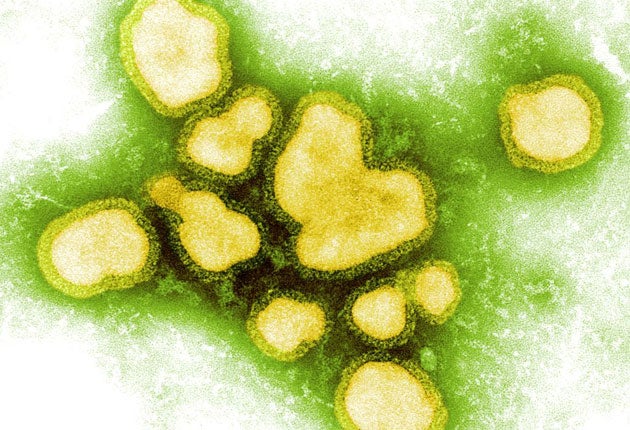Hopes raised for universal flu drug
New biological agents identified which may reduce the threat of a pandemic

Scientists have discovered a potential new treatment for flu which could be used to protect populations in the event of a pandemic.
Researchers identified three biological agents which neutralise the influenza virus in the laboratory. The agents, selected from tens of billions screened for anti-influenza activity, also protected mice from flu caused by the H5N1 avian virus and other seasonal viruses.
If human trials are successful the drugs could ultimately be added to the arsenals being established by countries against an expected flu pandemic. Britain announced earlier this month that it was doubling its stockpile of anti-viral drugs to provide enough for half of the population when a pandemic hits.
But the existing drugs, Tamiflu and Relenza, are of limited effectiveness and researchers are in a race against time to find more effective drugs. No one knows when the next pandemic will happen but they occur every few decades as the flu virus mutates. The last global pandemic was in 1968.
The newly discovered agents, known as monoclonal antibodies, could in theory be used alongside existing antiviral drugs to treat patients with pandemic flu (or ordinary winter flu) until a vaccine became available.
Vaccines against existing strains of flu already exist but, as the flu virus is constantly mutating, work on a new vaccine cannot begin until the pandemic strain is identified. There would then be a lag of four to six months while it was being developed and manufactured. During that window, the only defence against the disease would be treatment of infected individuals with drugs.
Anthony Fauci, director of the National Institute of Allergy and Infectious Diseases, part of the National Institutes of Health, which funded the study published in Nature Structural and Molecular Biology, said: “This is an elegant research finding that holds considerable promise for further development into a medical tool to treat and prevent seasonal as well as pandemic influenza. In the event of an influenza pandemic human monoclonal antibodies could be an important adjunct to antiviral drugs to contain the outbreak.”
The findings could also assist the development of future vaccines, the researchers from the Dana-Farber Cancer Institute and Harvard Medical School in Boston say. Flu still kills 250,000 people annually worldwide. Monoclonal antibodies could be used to treat individuals with lowered immunity who become infected. It could also be used to protect medical staff and the families of people infected.
Professor Wayne Marasco, who led the study, is optimistic about development of the new drugs. “These are fully human monoclonal antibodies ready for advanced preclinical testing,” he said.
Professor Peter Openshaw, director, Centre for Respiratory Infection, National Heart & Lung Institute, Imperial College London, said: “I don’t think it’s realistic to imagine making this antibody as a treatment – it would cost about £10,000 per month for an adult – but the fact it is possible for antibodies to be so broad in effect raises the possibility that a vaccine could be made that would make this sort of antibody, and work from one year to the next against as-yet undiscovered types of flu.”
Join our commenting forum
Join thought-provoking conversations, follow other Independent readers and see their replies
Comments
Bookmark popover
Removed from bookmarks